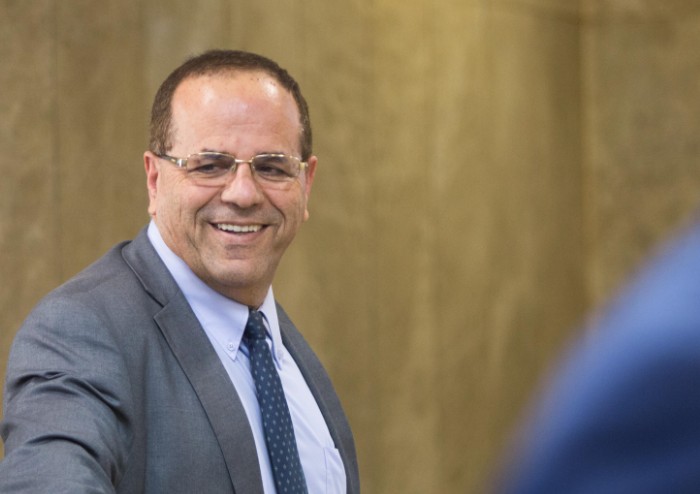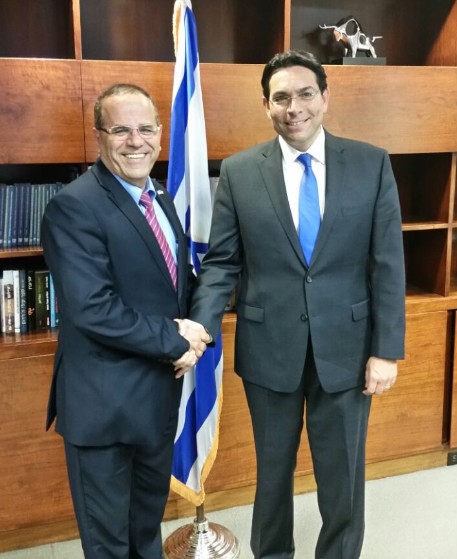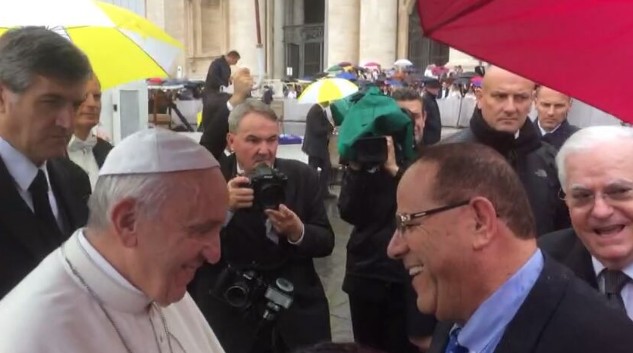Deputy Minister Ayoub Kara in Interview: “I Celebrate All Jewish Holidays”
Ayoub Kara, a Druze living in Daliyat al-Karmel, deeply loves the Jewish people. After losing two brothers in Israel's wars, he decided to embrace all Jewish holidays. This intriguing interview reveals Kara's strong connection to religious Jews.
 Deputy Minister Ayoub Kara (Photo: Flash 90)
Deputy Minister Ayoub Kara (Photo: Flash 90)Over the past year and a half, Deputy Minister Ayoub Kara has dedicated himself to a significant political mission: serving in the Knesset as the Deputy Minister for Regional Development, responsible for the non-Jewish sector in the state. This role involves meeting with various countries and promoting numerous initiatives across different fields. Despite his busy schedule, when we sit down with him, he opts to open up about his personal life.
“First of all, I want to introduce myself,” he says naturally. “I am sixty years old, belonging to the Druze community, speaking five languages, married to Rima, and living in Daliyat al-Karmel. I have five children, may they be healthy, the eldest is studying medicine at a university in Samaria, and the second has just completed his military service as a First Sergeant in the Israeli Air Force.”
Some might be surprised by the Kara family’s involvement in Jewish life, but that perhaps indicates a lack of knowledge about Druze life in Israel. “Unfortunately, the Jewish people don’t really know much about the Druze,” agrees the Deputy Minister, “A recent survey by our ministry showed that only 38% of the Jewish public is aware that Druze serve in the army. Another 20% said they had no idea, and the rest claimed it couldn’t be possible that Druze serve in the army. In my view, that’s ignorance, and it’s a recent survey.”
“I Celebrate All Jewish Holidays”
However, for the Kara family, their connection to the Jewish people goes beyond military service. “It might sound surprising, but my family and I celebrate Jewish holidays ever since we got to know them,” shares the Deputy Minister. “On Passover, we eat matzah and celebrate the Seder night. We build a sukkah on Sukkot here in Daliyat al-Karmel, and on Chanukah, we light a menorah. Except for Yom Kippur, where the fasting is contrary to the Druze religion and isn't possible for me, I really celebrate all the holidays and see it as sharing the fate of the Jewish people.”
Even in his political views, Ayoub Kara demonstrates strong ties to the Jews. “It is clear to me that the Land of Israel absolutely belongs to the Jewish people, and there’s no way to consider negotiations or surrendering parts of it,” he declares, “I say this in contrast to the views of the current Prime Minister, who from time to time seems capable of surrendering some areas.”
What led you to such a close connection with the Jewish people?
“This connection stems from the fact that my two brothers were killed in Israel’s wars, and I personally was injured in the Lebanon War, Operation Peace for Galilee. I remember being with a large group of Jewish soldiers then and telling them that, as a Druze, I am now tying my fate with the Jewish people. That is the main reason for my closeness to Judaism.”
 Deputy Minister Ayoub Kara (Photo: Flash 90)
Deputy Minister Ayoub Kara (Photo: Flash 90)How have the Arab parties in the Knesset reacted to this?
“The truth is, as is known, there’s a joint list of Arab members of parliament in the Knesset who really do not like my behavior. They view me as a traitor because there was always a silent unity between Arabs and Druze, as both leaderships see themselves in a kind of shared destiny towards their citizens. In the last Knesset, the Arab representatives felt that I betrayed them. But there’s nothing to do about it; these are my values, and I don’t compromise on values.”
Kara also notes, conversely, that he sees in a very negative light the absence of Arab representatives at the funeral of the late Shimon Peres. “This, in my opinion, is a mark of shame on the foreheads of the Arab representatives in the Knesset, not one of whom attended the funeral. I, too, personally never supported Peres’s political views and never agreed with the Oslo Accords, but I respected the man and his leadership roles in the state. I expected them to attend the funeral and not to disdain the Jewish people.”
Ask Them: “Show Identification”
Despite his strong connection and affinity with Israel, Deputy Minister Kara is very pained by the recurring reports he receives from his Druze brethren about racist behavior by Jews towards them. “Druze soldiers come to my office claiming they are cursed and that when they speak Arabic on the train or bus, they are suspected of being collaborators or terrorists. They tell me with tears, ‘We are soldiers, armed, and we protect the Jewish people. Arabic is our mother tongue, we want to continue using it, why are we being suspected?’ Recently, a Druze soldier approached me and told me that he was stopped while traveling on the train from Haifa to Tel Aviv and was checked on suspicion that he was a terrorist. Only after they called his unit commander, who confirmed, ‘He’s my soldier, drop this at once, and let the train continue,’ was he released.”
Kara speaks with deep pain: “The behavior of some Jews towards our community is racist and troubling. About six months ago, I met a sergeant in the armored corps at Hadassah Ein Kerem Hospital, who went to buy himself some food after completing a course, and then he was attacked by a group of three Jews who heard Arabic and began beating him severely. As a result, he lost consciousness and was hospitalized. I visited him in the internal medicine department after he recovered and asked him: ‘What would you propose to eliminate such an issue?’ and he replied, ‘I expect Israel to be less racist.’”
 Deputy Minister Kara during a visit to the Israeli Ambassador to the UN, Danny Danon, 15 days ago (Photo: Ayelet Dotan)
Deputy Minister Kara during a visit to the Israeli Ambassador to the UN, Danny Danon, 15 days ago (Photo: Ayelet Dotan)But isn’t it possibly more about the general security situation, where everyone is suspicious of each other, and people just want to protect themselves?
“That’s true,” he agrees, “and so I offer the simplest solution—if you see a soldier who raises your suspicion, you can just ask him to show his military ID. If it’s a regular citizen who arouses suspicion, ask him: ‘Sorry, do you have a blue ID card? May I see it?’ I am absolutely sure that 100% of the Druze will be more than happy to show you these IDs. “By the way,” he adds, “I recently returned from a visit to the US and saw at airports that Muslims are regularly asked to show IDs, not just by police officers, but by citizens and law enforcers. I saw this in both New York and Los Angeles. It's sad we’ve reached this point, but in my opinion, it's the only way to cope.”
Bring Our Boys Home
These days, Kara is occupied with the return of missing soldiers Oron Shaul and Hadar Goldin, may they rest in peace, and you can hear the sorrow in his voice when he talks about them: “I returned last week from the Vatican in Italy where I met with the Pope on the matter, as he has a direct and close connection with Hamas. Additionally, I have had numerous meetings with the families of the abducted in the Knesset, learning lessons from the Ron Arad case, where the family was not involved, which was unhelpful. I see great importance in involving the families and not distancing them from the negotiations or talks with neighboring countries. There are also other negotiations I was involved in that I cannot discuss, but I sincerely hope that this will happen and the abductees will come home.”
 Deputy Minister Kara during his visit with the Pope in the Vatican, Italy, last week (Photo: Ayelet Dotan)
Deputy Minister Kara during his visit with the Pope in the Vatican, Italy, last week (Photo: Ayelet Dotan)Do you think this will happen soon?
“Unfortunately, I don’t see them returning by the end of this year—2016. I really hope we won’t have to go to war with Hamas to bring them back through extensive military operations. I strongly oppose this and call on the terrorist organizations holding them: we have something to offer you in negotiations, let’s make a deal before a war.”
Do you mean a deal like the one during the Shalit exchange?
“A deal like the Shalit exchange won’t happen again; there’s no majority in the current government to release 1,200 terrorists, not even half that number. But there are several levers we can implement together with the new (or current) President of the United States as soon as they take office in January, as the American administration is always involved behind the scenes in this issue.”

